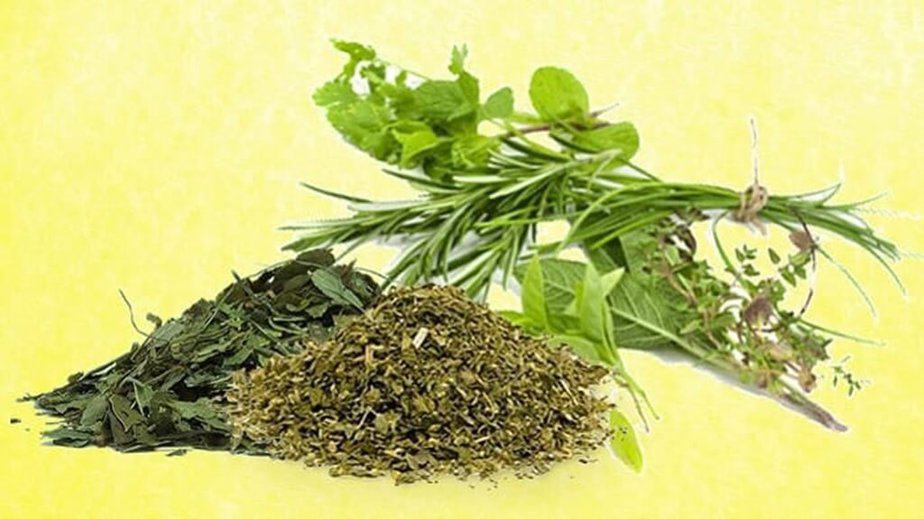Should I use dried herbs or fresh ones? Are fresh herbs better than dried herbs? It’s going to be an interesting discussion.
You may have heard on cookery shows celebrity chefs recommending fresh over the dried herb. Don’t subscribe to all those recommendations.
Obviously, fresh garden herbs offer bright flavors, color, and texture to your dish. However, some herbs taste better when they are dried.
What Are Fresh Herbs?
Fresh herbs are flavorful, aromatic green leafy plants used in small amounts to flavor and garnish dishes. They taste best when really fresh leaves and stems of herbs just harvested right before their use; staler they become lesser is their quality.
Fresh herbs are usually classified into two categories: hard herbs and soft herbs. Hard herbs taste better and easy to eat when they are cooked whereas soft herbs are best when eaten raw. For example, rosemary and thyme are hard herbs but basil and parsley are soft herbs.
Soft herbs are either stirred into cooked dishes or used as a raw garnish. Hard herbs need to be moderately cooked or steamed; usually added to the dish towards the end of cooking.
Overall, fresh herbs in the dish add a delicious depth of flavor and a voluminous greenish texture.
When to Use Fresh Herbs?
Delicate herbs are always better fresh but they lose a good bit of their flavor and aroma when dried. Soft herbs like tarragon, parsley, and chives always taste the best when used fresh.
Raw herbs are a necessary part of salad dressing; fresh tarragon and basil are something that you shouldn’t miss out on while making salads. Use chopped fresh leaves of cilantro or raw parsley in cream sauce.
Fresh herbs are highly versatile and can easily be included in most vegetable dishes provided you pick the right herbs with suitable flavor profiles compatible with the recipe.
Soft herbs like basil, cilantro, parsley, fennel, tarragon, or chives should always be used raw for the best flavor and aroma. On the other hand, hard herbs like thyme, rosemary, dill, marjoram, oregano, mint, sage, or bay leaves have a better taste when moderately cooked or boiled.
What Are Dried Herbs?
Dried herbs, evident from the name, are herbs selectively dried in the sun or oven. They are not only convenient for preservation and use but also less expensive than fresh ones. In addition, most dried herbs have a more concentrated flavor than fresh herbs. However, their flavor and aroma begin to diminish after a year. If they are well preserved in an airtight container, dried ground herbs like bay leaf, lavender, oregano, or lemon balm last for 2-3 years. Dried herbs stored in their natural, whole form should last longer, up to 4 years.
Importantly, herbs like basil, chives, borage, parsley, and cilantro lose a lot of their punch when dried. Freezing is a better option to preserve such delicate herbs than drying.
When to Use Dried Herbs?
Among the common herbs, bay leaf, lavender, dill, lemon balm, oregano, rosemary, marjoram, curry leaf, and thyme taste better when dried.
According to the traditional wisdom of cooking, use dry herbs in dishes that have to stay on the stovetop for more than a few minutes. Of course, hard herbs like rosemary, thyme, or oregano can be used either dry or fresh in cooked dishes.
Fresh leaves of soft herbs such as basil, cilantro, parsley, mint, or tarragon will lose their flavor if cooked. However, dried soft herbs can be added to your dish towards the end of cooking.
Most dry herbs, especially hard herbs like rosemary, thyme, or oregano, should be ground or finely minced before adding them to your dish. Add the dried herbs to the meal during cooking for it helps in a better release of their flavor and aroma.
Dried Herb Vs. Fresh Herb
Most dried herbs have a spicier, deeper flavor than fresh herbs. Because of this, add fewer dry herbs to your dish than fresh herbs.
Dried herbs are thoroughly dehydrated and thus they have less oil. Even the little oil they have is trapped deeper inside the herb. For this reason, add dry herbs to your dish during cooking which allows maximum release of those flavors. On the other hand, add fresh herbs to the dish at the last minute of cooking. The reason is simple; most fresh herbs tend to lose their flavor if cooked for more than a couple of minutes.
Every herb is not the same. Some dry herbs cannot be substituted for fresh and vice versa. Common herbs like parsley, basil, and dill lose or change their flavor when dried. The earthy and peppery flavor of fresh parsley practically disappears when it is dried. Dehydrated basil tastes more like mint sans the sweet and savory taste of fresh basil.
Some dried herbs taste amazingly more wonderful than when they are fresh. For instance, dried oregano is a bold and earthy flavor with a great aroma reminiscent of organic compound camphor. Dried bay leaves have a well-pronounced minty flavor with a mild bitterness.
Substitutions
Dried herbs are often more potent and concentrated than fresh herbs, thus you need less when using them in place of fresh.
As a common rule, use 1 teaspoon of dry herb for every 3 teaspoons of fresh herb. For example, if a recipe calls for 3 teaspoons of fresh oregano, use 1 teaspoon of dried oregano instead. The rule is reversed when substituting fresh herbs for dried ones; if your recipe calls for 1 teaspoon of dried rosemary, add 3 teaspoons (1 tablespoon) of fresh rosemary.
Read more about herbs:
